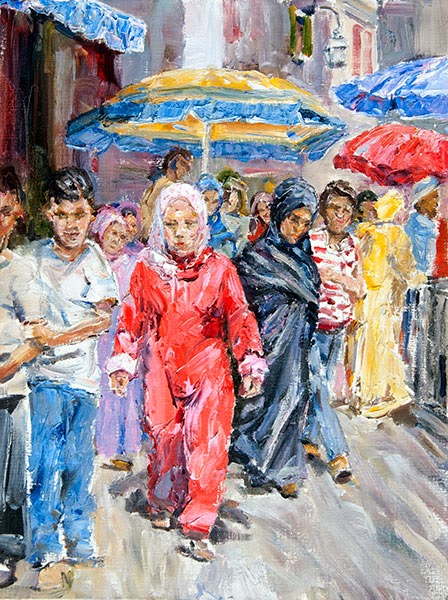Last night as I was meditating before bed, something unusual happened.
I am in Denver, Colorado for an art show. My hotel is quite comfortable and a block away from the festival grounds. Sitting on a couch in a dark room, I had been quieting my mind but had been thinking of various situations present in my life. One in particular has occupied my thoughts—the extreme conditions of an Egyptian family I am friends with. (See: Inshallah)
Strangely, as I sat still and upright, a teardrop formed in my right eye. Slowly my eye brimmed and the drop flowed down my cheek. I wondered where it came from.
Retracing my thoughts, I realized I had remembered Amira, the oldest daughter of Hagag. I had worked hard to collect some money for her college, which is an impossible dream for any of the five children. Amira, eighteen, is a pure soul, shy yet intelligent and strong.
The family has many pressing needs. It has been decided to use any money to help her mother with urgent eye surgery. The first installment of funds has been delivered. The family will be relieved that Edleah will have her eyesight protected. But I know too that Amira sleeps on the hard earth at the feet of her brothers and sister every night.
The tear that fell down my face was her tear, the one she would never show her family.
I am in Denver, Colorado for an art show. My hotel is quite comfortable and a block away from the festival grounds. Sitting on a couch in a dark room, I had been quieting my mind but had been thinking of various situations present in my life. One in particular has occupied my thoughts—the extreme conditions of an Egyptian family I am friends with. (See: Inshallah)
Strangely, as I sat still and upright, a teardrop formed in my right eye. Slowly my eye brimmed and the drop flowed down my cheek. I wondered where it came from.
 |
Retracing my thoughts, I realized I had remembered Amira, the oldest daughter of Hagag. I had worked hard to collect some money for her college, which is an impossible dream for any of the five children. Amira, eighteen, is a pure soul, shy yet intelligent and strong.
The family has many pressing needs. It has been decided to use any money to help her mother with urgent eye surgery. The first installment of funds has been delivered. The family will be relieved that Edleah will have her eyesight protected. But I know too that Amira sleeps on the hard earth at the feet of her brothers and sister every night.
The tear that fell down my face was her tear, the one she would never show her family.














































